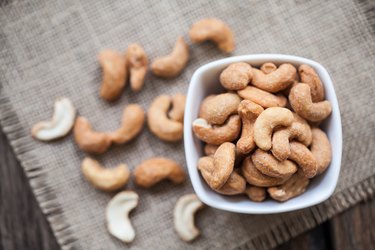
Cashews are a smart snack: They pack in all three macronutrients — carbohydrates, protein and fat — as well as vitamins and minerals. However, the salted variety clearly contain more sodium than raw cashews, which can be a nutritional disadvantage.
Read more: 9 Healthy Nuts That May Help You Live Longer
Video of the Day
Video of the Day
Cashews Pack in Healthy Fats
While raw cashews are high in mostly healthy, unsaturated fat, salted cashews are often roasted in peanut oil, which can add to the saturated fat content. Typically, an ounce serving (about a handful) of salted cashews contains 9.5 grams of unsaturated fat and 2.5 grams of saturated fat, which is 13 percent of your daily recommended value.
Unsaturated fats include monounsaturated and polyunsaturated fats, both of which are found in cashews. Unlike saturated fats, which can raise LDL (bad) cholesterol, unsaturated fats may help raise HDL (good) cholesterol, according to Harvard Health Publishing.
What's more, because of their high fat content, cashews are calorically dense. One ounce packs in 160 calories.
Carbs and Protein in Salted Cashews
Salted cashews are moderate in both carbohydrates and protein. An ounce of cashews packs in about 9 grams of carbs with 1 gram of fiber. Although cashews aren't too high in carbs, they are higher in carbs than most types of nuts like pistachios and almonds. But that's not necessarily a downside: Carbs are an important nutrient that your body uses as a primary energy source, according to the National Institute on Aging.
A handful of cashews also provides about 5 grams of protein. While 5 grams doesn't make a huge dent in your daily recommended value, a little protein in your snack will help promote satiety.
Vitamins and Minerals in Cashews
While paying attention to your macronutrients (fat, carbs and protein) is important to ensure a healthy diet, the micronutrients (minerals and vitamins) in your foods are just as vital for keeping your health in tip-top shape.
Salted cashews provide about 1.8 milligrams of iron, which is about 10 percent of your daily recommended value. Iron carries oxygen in red blood cells throughout the body to produce energy, according to the Academy of Nutrition and Dietetics. When iron levels are low, you may begin to experience fatigue or weakness.
An ounce of cashews also provides about 80 milligrams of magnesium, which is about 20 percent of your daily value. Magnesium plays a big role in helping maintain healthy bones and a healthy heart, according to the Academy of Nutrition and Dietetics. Nuts, like cashews, are typically rich in magnesium as are leafy greens and whole grains.
Bottom Line: Are Salted Cashews Healthy?
While salted cashews contain a number of beneficial nutrients, they contain a moderate amount of saturated fat and salt thanks to the roasting process. An ounce of salted cashews contains about 100 milligrams of sodium, which is 4 percent of your daily recommended value.
Sodium is a mineral that can help promote hydration and regulate central nervous system function, but excess sodium may raise your blood pressure, which can spell bad news for your heart and kidneys, according to the Academy of Nutrition and Dietetics.
Although salted cashews can be a nutritious snack, they're not low in calories and contain more salt than the unsalted varieties. So it's important to watch your serving sizes — especially if you already have high blood pressure and need to cut salt from your diet.
However, if you're looking for an even healthier alternative, raw, unsalted cashews are a better bet.
Read more: 19 Fast, Healthy Convenience Store Snacks
- USDA: "Salted Cashews"
- Harvard Health Publishing: "Know the Facts About Fats"
- National Institute on Aging: "Important Nutrients to Know: Protein, Carbohydrates and Fats"
- Academy of Nutrition and Dietetics: "Iron"
- Academy of Nutrition and Dietetics: "What is Magnesium?"
- Academy of Nutrition and Dietetics: "Is Sodium the Same Thing as Salt?"